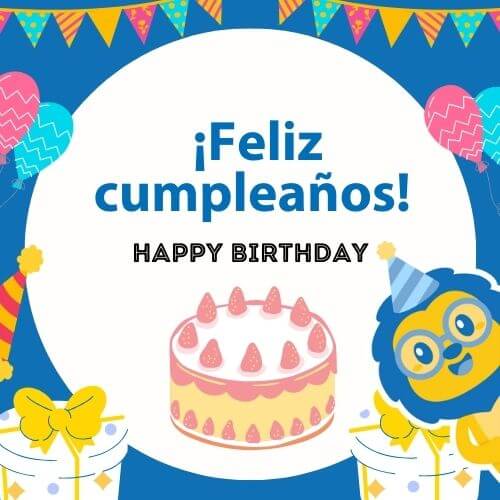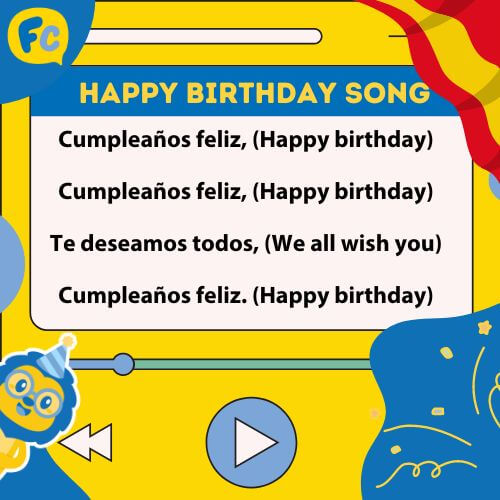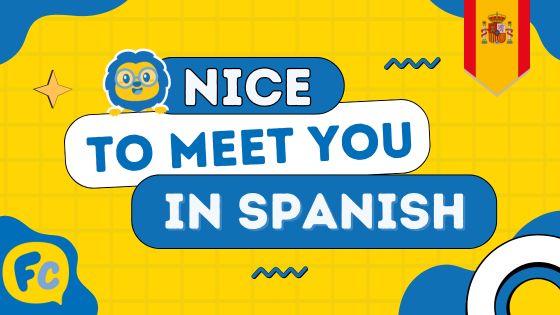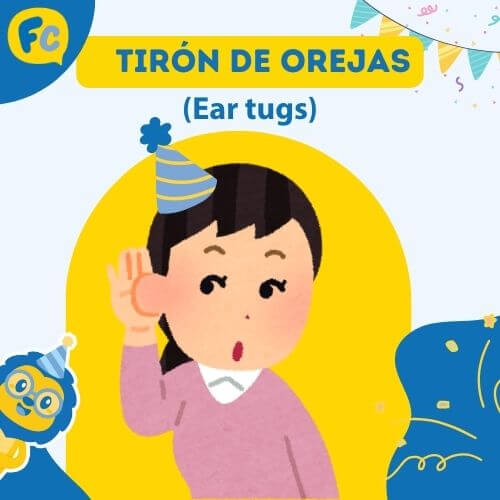Here's How to Wish Someone Happy Birthday in Spanish🥳
Happy Birthday in Spanish
PLUS Traditions and Customs 🎂🎁
Who doesn’t love to celebrate a birthday? Spain is no different!
In fact, Spain goes beyond just celebrating one’s birthday. Each one has two special days in a given year in Spain. Yes, it’s a double treat in Spain!

In Spain, one has two significant dates within a year, a birthday (cumpleaños) and a feast day (onomástica). Both dates are considered important moments in a person’s yearly journey. So it’s almost like having two birthdays to celebrate!
The first one, the birthday, celebrates the day one was born and the second one, the feast day, celebrates the day of the saint after whom one was named. So, for instance, if you’re named José, then your feast day is on March 19th.
As Spain has traditionally been a Catholic country, most newborns (up until recent years) were named after saints. While this particular celebration is losing steam with the secularization of society, it is still considered a very Spanish deep-rooted tradition.
Let’s join the fun in a Spanish Birthday, or cumpleaños
Happy Birthday in Spanish || Birthday Wishes in Spanish
Happy Birthday in Spanish || Birthday Traditions in Spain
Happy Birthday in Spanish || Spanish Birthday Quirks
Happy Birthday in Spanish || Quiz
Happy Birthday in Spanish || FAQs
Happy Birthday in Spanish ||
Birthday Wishes in Spanish
Thinking of celebrating your birthday in Spain or have a Spanish friend you wish to greet Happy Birthday? Then here are the most commonly used phrases that you can use in practically any context:
| SPanish | english |
|---|---|
| ¡Feliz cumpleaños | Happy Birthday! |
| ¡Felicidades! | Congratulations! |
| ¡Muchas felicidades! | Many congratulations! |
👉 Lastly, let’s have some grammar to wrap up the celebratory birthday greetings (pun intended).
When greeting someone a Happy Birthday in Spanish and in writing, the word cumpleaños (birthday) is a common name and therefore is not capitalized (unless, of course, it is the first word in a phrase).
Here are some examples of the correct use of the word cumpleaños in writing:
¡Te deseo feliz cumpleaños! (I wish you a Happy Birthday! – informal you) or
¡Le deseo feliz cumpleaños! (I wish you a Happy Birthday! – formal you)

Other birthday greetings:
¡Feliz cumple! (the abbreviated and more casual version of ¡Feliz cumpleaños!
¡Que cumplas muchos más! (equivalent to saying ‘Wishing you many more!’)
¡Te deseo un feliz día! (I wish you a happy day!)
¡Disfruta de tu día! (Enjoy your day!)
Feast day greetings:
In case you want to cast out some feast day greetings, here are the most commonly used ones:
| ¡Feliz día de tu santo! (¡Feliz santo!) | Happy Saint’s Day |
| ¡Felicidades! | Congratulations! |
| ¡Felicidades en tu día! | Congratulations on your day! |
Happy Birthday in Spanish ||
Birthday Traditions in Spain
In Spain, when celebrating a birthday, the non-negotiables are cake, song and candles. And ideally, some cava as well (the Spanish quintessential celebratory bubbly) to clink those flute glasses in celebration.

👉 Here is your checklist:
For starters, Spain is really no different from other countries when it comes to birthday cakes. No birthday celebration is the same without a celebratory cake atop with candles marking the number of years one is turning.
Now for the birthday song. As soon as you have your cake ready with lit candles on top, make sure to have this birthday song in your repertoire, to be sung right before the celebrant blows out the candles (and makes a wish):
🎁 And gifts to the celebrant are always a welcome plus. 🎁
On a bubblier note, Cava and celebrations in Spain almost always go hand-in-hand. Cava, Spain’s answer to French Champagne and produced and grown in the region of Cataluña, is a light bubbly white sparkling wine.
👉 So, if there is an occasion to celebrate in Spain, expect the clinking of glass flutes with Spanish cava, served nice and chilled.

Nice to Meet You in Spanish – Essential After an Introduction Vocabulary 🇪🇸👋
Nice to Meet You in Spanish Is Much More Than Just a Courtesy Reply – Tips for When Being Introduced 👫 First impressions are what count, or so the adage goes. So if we want to make a good and…
Happy Birthday in Spanish ||
Spanish Birthday Quirks
What makes birthdays unique in Spain? Here are some Spanish birthday quirks or traditions, that will surely peak your interest.
The ear tugs

In Spain, there is a quirky birthday ritual called tirón de orejas (ear tugs), where it is admissible and expected for the birthday celebrant’s ears to get tugged, once for each year the celebrant is turning.
So, if you’re turning 20, then expect 20 tugs (hopefully gentle) by each one who remembers to do so. It is actually quite fun to watch how the celebrant has to stoically endure the tugs, as traditionally each pull symbolizes growth and the passage of time.
😄 Oh and come to expect an extra tug for good luck.
Puesta de largo (or coming of age celebration)
In Spain, once you turn 18, you’re no longer considered a minor (at least legally) and are deemed a full-blown adult (mayor de edad).
A tradition that celebrates this coming of age for younger women is called the puesta de largo (which literally means to ‘dress in long gowns’), similar to the English concept of a debut.
This celebration signifies a younger woman’s transition from adolescence to adult womanhood.
Originally, puestas de largo were meant to celebrate a young woman’s coming of age and her introduction into high society.
Nowadays, even though many families may choose not to indulge in this tradition, turning 18 in Spain is still considered a significant milestone worth a bigger celebration, as one formally enters adulthood.
You pick up the bill
If it’s your birthday and you’re out having drinks, tapas or a meal with friends, family or co-workers, buckle up because you are usually expected to pick up the bill (or at least part of it).
🎉 Know that when in Spain, an extra dose of generosity is a given when it’s your birthday!
Happy Birthday in Spanish || Quiz
After Enjoy the birthday party, let’s check out these Spanish essentials?
👉 How to Say Nice to Meet You in Spanish
Happy Birthday in Spanish || FAQs
How do you wish someone a Happy birthday in Spanish?
Across the board, the universal birthday greeting (in Spanish) is ¡Feliz cumpleaños!, which translates to “Happy Birthday!”. This greeting can be your go-to, as it is good for any occasion, context and gender.
There are other ways to wish someone a Happy Birthday and here are some of the most commonly used alternative greetings in Spain:
¡Feliz cumple! (the abbreviated and more casual version of ¡Feliz cumpleaños!
¡Felicidades! (which literally translates to Congratulations!)
¡Muchas felicidades! (Many congratulations!)
How to respond to a birthday wish in Spanish?
When someone wishes you a Happy Birthday, thanks are in order, so feel free to use any of the following statements of gratitude:
¡Muchas gracias! (Thank you very much!)
¡Gracias! (Thank you!)
!Muchas gracias por tu felicitación! (Thank you very much for your greeting!)]
Do Spanish people have two birthdays?
Well, technically no, although there are usually two very special days that many Spanish celebrate in a given year. The first being their birthday and the second their feast day.
The first one, the birthday, celebrates the day one was born and the second one, the feast day, celebrates the day of the saint after whom one was named. So, for instance, if your name is Esteban (Steve), then your feast day is on December 26th.
Spain being a traditionally Catholic country, until recently most newborns were named after saints. While this particular tradition is losing steam with the secularization of society, it is still considered a very rooted Spanish one.
Do Spanish have birthday cakes?
Yes, very much so! In Spain, the birthday cake is referred to as pastel de cumpleaños or tarta de cumpleaños (birthday tart).
Although cakes and pastries in general in Spain tend to be of a lighter kind and not as rich (most especially in comparison to their American counterparts), what’s a must always in a birthday cake are the candles, lit atop the cake.
What do they sing for birthdays in Spain?
The song most commonly sung as a celebratory birthday tune in Spain is similar to the English Happy Birthday melody, called Feliz cumpleaños. It’s a simple song that goes like this,
Cumpleaños feliz, (Happy birthday)
Cumpleaños feliz, (Happy birthday)
Te deseamos todos, (We all wish you)
Cumpleaños feliz (Happy birthday)
Want More From LTL?
FANCY LEARNING SPANISH? Check out our online Spanish courses here.
We offer a 7-day free trial to all online students where you can study Spanish 24/7. It doesn’t end there either.
We teach over 10 of the world’s most popular languages 😎
Come and be a part of our amazing community.











